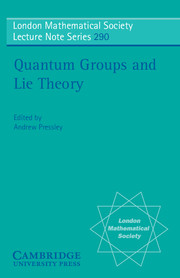Book contents
- Frontmatter
- Contents
- Introduction
- Lectures on Cyclotomic Hecke Algebras
- An Introduction to Group Doublecross Products and Some Uses
- Canonical Bases and Piecewise-linear Combinatorics
- Integrable and Weyl Modules for Quantum Affine sl2
- Notes on Balanced Categories and Hopf Algebras
- Lectures on the dynamical Yang-Baxter Equations
- Quantized Primitive Ideal Spaces as Quotients of Affine Algebraic Varietie
- Representations of Semisimple Lie Algebras in Positive Characteristic and Quantum Groups at Roots of Unity
- The Yang-Baxter Equation for Operators on Function Fields
- Noncommutative Differential Geometry and Twisting of Quantum Groups
- Finite Quantum Groups and Pointed Hopf Algebras
- On Some Two Parameter Quantum and Jordanian Deformations, and their Coloured Extensions
- Tensor Categories and Braid Representations
Tensor Categories and Braid Representations
Published online by Cambridge University Press: 05 November 2009
- Frontmatter
- Contents
- Introduction
- Lectures on Cyclotomic Hecke Algebras
- An Introduction to Group Doublecross Products and Some Uses
- Canonical Bases and Piecewise-linear Combinatorics
- Integrable and Weyl Modules for Quantum Affine sl2
- Notes on Balanced Categories and Hopf Algebras
- Lectures on the dynamical Yang-Baxter Equations
- Quantized Primitive Ideal Spaces as Quotients of Affine Algebraic Varietie
- Representations of Semisimple Lie Algebras in Positive Characteristic and Quantum Groups at Roots of Unity
- The Yang-Baxter Equation for Operators on Function Fields
- Noncommutative Differential Geometry and Twisting of Quantum Groups
- Finite Quantum Groups and Pointed Hopf Algebras
- On Some Two Parameter Quantum and Jordanian Deformations, and their Coloured Extensions
- Tensor Categories and Braid Representations
Summary
Abstract. Representations of braid groups of types A and B are discussed which are useful for the purpose of extending an analog of Schur duality to quantum groups also of Lie type other than A. In particular, this contains some new results in connection with spinor representations and and with exceptional Lie types. As a possible application, a reconstruction technique is described which so far has been successfully applied to classify tensor categories whose Grothendieck semiring is equal to Rep(SU(N))
Classically, the symmetric groups were used to describe representations of the general linear group Gl(N) by decomposing tensor products of its vector representations. For other Lie types this approach becomes much more complicated or is not available. For quantum groups, the symmetric groups are replaced by braid groups which have a far richer representation theory. The purpose of this article is to describe how braid groups can be used to decompose tensor products of representations of quantum groups and the corresponding objects in fusion categories.
In Section 1 we review Schur duality, and its analog for quantum groups of type A discovered by Jimbo. Using representations of Hecke algebras of type A, one can completely classify any rigid semisimple monoidal tensor category whose Grothendieck semiring coincides with the one of Rep(SU(N)). This result also extends to the associated fusion categories.
In Section 2, braid representations are considered which can be regarded as a q-analog of Brauer's centralizer algebra for orthogonal and symplectic groups.
- Type
- Chapter
- Information
- Quantum Groups and Lie Theory , pp. 216 - 234Publisher: Cambridge University PressPrint publication year: 2002

